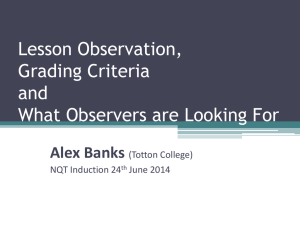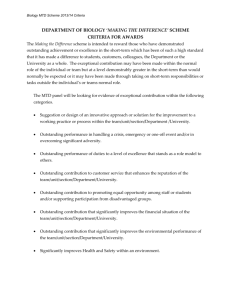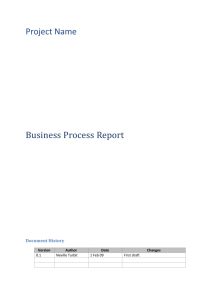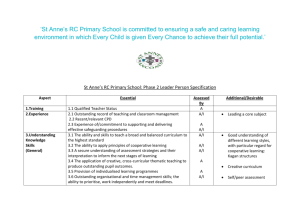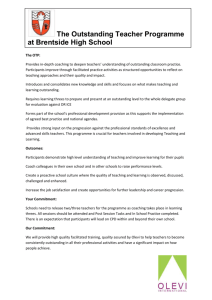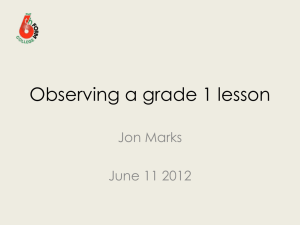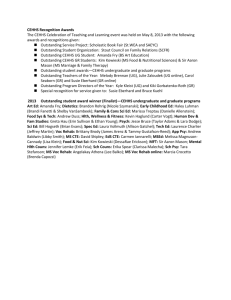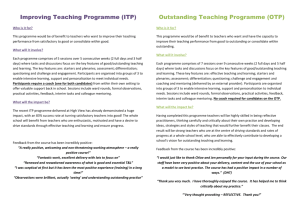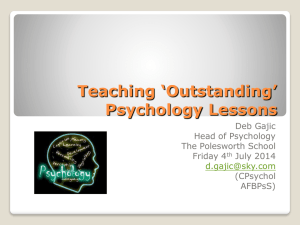Planning and delivering Outstanding lessons
advertisement
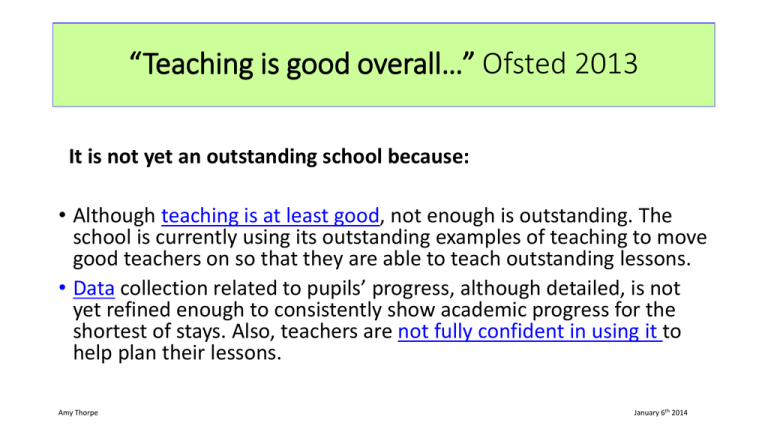
“Teaching is good overall…” Ofsted 2013 It is not yet an outstanding school because: • Although teaching is at least good, not enough is outstanding. The school is currently using its outstanding examples of teaching to move good teachers on so that they are able to teach outstanding lessons. • Data collection related to pupils’ progress, although detailed, is not yet refined enough to consistently show academic progress for the shortest of stays. Also, teachers are not fully confident in using it to help plan their lessons. Amy Thorpe January 6th 2014 How do you feel when you know you’re being observed? Planning and delivering Outstanding lessons “as the teacher, [you] are responsible for the amount, or lack, of planning you put into lessons; you, the teacher, will be on the receiving end of the consequences if you attempt to wing it” Phil Beadle 2010. ‘How to Teach’. Let’s be realistic… We all know we don’t perform to the top level every lesson of every day… in fact, it would probably be impossible! However, your lesson observations provide an opportunity for you to show the observer you and your students at your best: “You can’t give of your absolute best to every class, every lesson. If you attempt to do this you will find that you have exhausted your physical and emotional reserves within the first two or three weeks of term, and … As a rule of thumb, it’s probably a good policy to give each of your classes a version of your best at least once a week…but don’t expect to be able to turn in the full Ofsted [style lesson] every lesson.” Phil Beadle 2010 However… “..If you want to be seen to be a really good teacher then you must… come to a pretty quick and certain realisation that you must take observed lessons deadly seriously.” Phil Beadle 2010 What do we need to remember? And you can’t do that without some thought and planning! Is there a lesson plan or is the lesson planned? Further reading an be found in ‘A Teacher’s Guide to Outstanding Lessons’ available free from: www.solutionsforschool.co.uk Planning…Show the observer everything that usually occurs in your head! How will I know when they have got there? CLASSROOM PRACTICE ASSESSING Where are my students now? How will they get there? PLANNING REPORTING What do I want the students to learn? What do they still need to know? Example … Overview of lesson: • Student new to outreach – 2 lessons prior to observation • One to one • Year 9 student • English lesson • Ability slightly below average • Difficulty concentrating at times • Poor SSPG skills • Work not yet provided by home school In the pack: • Lesson plan • Copy of power point • Copy of all resources for lesson • Copy of baseline assessment (marked piece of work) • Curriculum and assessment information * (If the student had been with us for a while, historical data would be included) MY TOP TIPS: • Plan in detail • Use the lesson observation form to guide your planning – focus on how to achieve Outstanding • Provide everything your observer may require - e.g: marking, baseline information, progress data, student information, homework information, curriculum information, assessment information, copies of all resources used, information on prior learning… • Plan for anything that may go wrong and how you might correct it! This doesn’t mean it will…but think it through! • Plan how you will extend their learning through questioning • Write down everything that you normally THINK about… you need to show you think about it…and we can do that by writing it down! And then when you’re informed that you are to be observed, you’ll go… FROM THIS TO THIS Remember… It’s your opportunity to demonstrate just how good you are!
